The lawsuit argues that Trump’s presidential proclamation violates laws guaranteeing the right to claim asylum on reaching U.S. soil.
A coalition of immigrant advocacy groups has sued the Trump administration over a presidential proclamation that temporarily suspends the entry of unverified immigrants across the U.S. southern border until a time when the president determines that “the ongoing invasion” has concluded.
The entry ban has restricted access for asylum seekers from gaining access to American soil while they wait for their applications for refuge to be processed.
The lawsuit was filed in federal court in Washington, D.C., on Feb. 3 by the American Civil Liberties Union (ACLU) on behalf of three immigrant advocacy groups in Arizona and Texas. It challenges the Jan. 20 emergency proclamation signed by President Donald Trump that blocks potential refugees from physically claiming asylum or other protections in the United States until the federal government reclaims “operational control of the border.”
Trump’s proclamation reads: “The entry into the United States on or after the date of this order of aliens engaged in the invasion across the southern border is detrimental to the interests of the United States. I therefore direct that entry into the United States of such aliens be suspended until I issue a finding that the invasion at the southern border has ceased.”
The proclamation added that the president has the inherent powers to “rapidly repatriate [aliens] to an alternative location.”
The proclamation cited Article II and Article IV, Section 4, of the U.S. Constitution; the Immigration and Nationality Act (INA); and section 301 of Title 3, United States Code as its legal basis.
The ACLU and others argue in their lawsuit that Trump’s proclamation violates decades-old laws and treaties that ordinarily allow anyone who sets foot on U.S. soil to apply for asylum.
Specifically, they claim that Trump’s order violates the INA, which they said guarantees the right to seek asylum for those who reach U.S. territory. It also argues that the presidential proclamation unlawfully overrides Congress’s authority and disregards protections under U.S. and international law, including the Refugee Act of 1980 and the Convention Against Torture.
“The Proclamation is as unlawful as it is unprecedented,” the complaint states. “If the Proclamation may lawfully abrogate the statutory protections at issue here, then every future President may sweep away at whim the protections that Congress provided in the INA. Our separation of powers rebels at that idea.”
Furthermore, the lawsuit contends that the proclamation exceeds the president’s authority under INA section 212(f), which allows the president to suspend entry but does not authorize the expulsion of individuals already present in the country or the denial of their right to seek humanitarian protection. This is the same legal authority Trump used during his first term to enact travel ban policies targeting Muslim-majority countries. Sometimes referred to as the “Muslim ban,” that policy was challenged in court and ultimately upheld by the U.S. Supreme Court.
The White House defended the proclamation and Trump’s actions on border security.
“President Trump was given a resounding mandate to end the disregard and abuse of our immigration laws and secure our borders. The Trump administration will continue to put Americans and America First,” White House spokesman Kush Desai said.
Asylum, formally established in the United States with the Refugee Act of 1980, is a humanitarian protection for individuals fleeing persecution based on race, religion, nationality, or political beliefs.
The Trump administration argues that the asylum system is being exploited by illegal immigrants and human traffickers at the southern border as a loophole for illegal entry.
Tom Homan, Trump’s border tzar, has claimed the system is overwhelmed with false asylum claims, allowing illegal immigrants to stay and work in the United States for years without deportation.
Trump has tasked Homan with leading a massive operation to deport individuals who are in the country unlawfully, as part of the president’s sweeping crackdown on illegal immigration.
Since taking office, Trump has acted decisively on immigration enforcement, including declaring a national emergency at the southern border and ordering federal agencies to take immediate action to repel, repatriate, and remove illegal immigrants attempting to cross the border.
He also issued an executive order on Jan. 20 suspending the current U.S. refugee admissions program (USRAP) until reforms to the program are made to ensure that further refugee arrivals align “with the interests of the United States.”
Trump has ordered the Secretary of Homeland Security Kristi Noem and Secretary of State Marco Rubio to advise his office on “whether resumption of entry of refugees into the United States under the USRAP would be in the interests of the United States” within 90 days, noting that the program can resume when it affirms U.S. interests.
The Associated Press contributed to this report.

